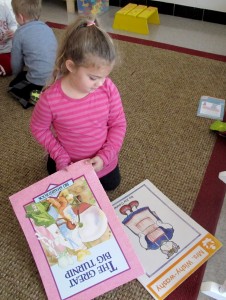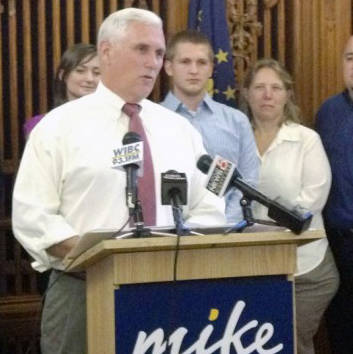Can Other Indiana Communities Duplicate Columbus' Successful Preschool Program?

Elle Moxley / StateImpact Indiana
A student at Busy Bees Academy, a public preschool in Columbus, Ind., flips through books before story time.
A coalition of school, community and business leaders has built a successful pre-kindergarten program in Columbus that Governor-elect Mike Pence called a “pilot” for the state.
Together, the Bartholomew Consolidated School District and the Community Education Coalition opened Busy Bees Academy, a public preschool program that serves a large number of low-income families who couldn’t otherwise afford to enroll their kids in early education. But not every Indiana city has a major economic driver like Cummins to help spur public-private partnerships.
“We are blessed with a leading Fortune 250 company, so the big question is can communities of 5,000 or 600 or smaller communities in rural America have that same kind of opportunity?” says John Burnett, president of the Community Education Coalition. “And the answer is yes.”
Burnett concedes that having Cummins in Columbus’ backyard has been “enormously helpful.” But he’s also convinced a similar model would work for other Indiana cities. That’s why his group wants to help other communities build their own partnerships to tackle education, healthcare and economic growth.
How Other Communities Might Build On Columbus’ Success
Burnett says Columbus has always been good at developing public-private partnerships to support education. For example, the Columbus Learning Center connects Indiana University-Purdue University Columbus and Ivy Tech so the schools confer more degrees in fields the region needs. Those talks began when the Community Education Coalition formed in the 1990s.
But the push to develop an early education system is more recent. Busy Bees opened in 2009. In addition to helping operate the preschool, Burnett’s group awards scholarships for students to attend private pre-K programs in the community. He says interest in how to duplicate the Columbus model elsewhere was the impetus for creating the Institute for Coalition Building.“We created the institute within the Community Education Coalition because we’ve had so much interest in how we’ve brought the stakeholders from business, education, government, community foundations together around education to serve the students, so that will be the focus for the first few years,” says Burnett.
Jack Hess is the executive director of the Institute for Coalition Building, which launched earlier this month. The organization will work with communities in the region who want to tackle issues through public-private partnerships similar to what the Community Education Coalition has built in Columbus.
“I think the timing is perfect. I think communities are looking at coalition-building as a way to address their grandest challenges,” says Hess.
Governor-elect Pence wants to see communities solve problems — like how to provide pre-K to more students — locally.
“I want to examine ways that we might be able to catalyze that, give incentives for it to continue to grow, and in that sense, build on what’s happening in Indiana for the good of our kids,” Pence told StateImpact.
Hess is confident his group can help communities do just that. The method Columbus uses to build coalitions is based on the stakeholder process, which at its heart involves getting everyone with a vested interest in the project to the table so they can set common goals. Hess says small, local businesses have as much at stake in their communities as Cummins does in Columbus.
“Every community has assets,” says Hess. “They have something to build it from.”
Why Public-Private Partnerships Might Not Help Every District
But not every community has the same assets as Columbus. That’s the point Libby Cierzniak, an attorney at Faegre Baker Daniels who lobbies the General Assembly for the Indianapolis Public Schools, made earlier this year about a referendum to pay for pre-K in Bartholomew County.
The school district and the Community Education Coalition couldn’t sell voters on a tax levy increase of 5 cents per $100 of assessed valuation. That’s bad news for districts that would have to ask voters for much more to pay for pre-K.
“Say you have a school district with a much lower assessed value,” Cierzniak told StateImpact. “It’s going to take them a much higher tax rate to provide the same basic educational services, and in all probability they’re probably a poorer school district than Bartholomew Consolidated and in greater need of having preschool.”

